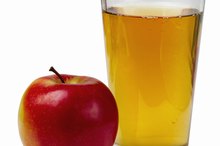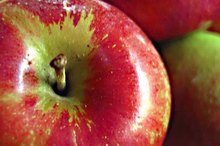Proteins to Dissolve Blood Clots
Blood clots form when your blood vessels are injured, which is part of the healing process and usually desirable, but sometimes the process clogs arteries and veins, forming thrombi. Thrombi are made mostly of a fibrous protein called fibrin, which is difficult to dissolve. Over time, thrombi can completely block a blood vessel and lead to increased blood pressure and heart attacks, or some of it can break-off and lodge within a smaller vessel in the brain, causing a stroke. Some protein-based enzymes are effective at dissolving blood clots and reducing the risk of cardiovascular diseases.
If you are experiencing serious medical symptoms, seek emergency treatment immediately.
Blood Clotting
Blood clotting is essential, but sometimes your body responds inappropriately to injury or other biochemical factors and over does it. Fibrin is an insoluble protein that plays a primary role in the formation of blood clots and scar tissue. During blood clotting, fibrinogen converts into fibrin, which is laid down like mortar inside your damaged blood vessel. Blood platelet cells aggregate around the fibrin matrix and harden, which is the structural framework of a blood clot. Overproduction of fibrin, which occurs with age or in response to certain chemicals, leads to excessive blood clotting and may also be linked to multiple sclerosis, asthma and Alzheimer’s disease, according to “Human Biochemistry and Disease.” Healthy people usually produce enough plasmin, an enzyme that naturally dissolves the fibrin in blood clots, but aging and disease reduces its production 1. You can take other protein-based enzymes to help prevent excess fibrin from becoming a problem, although consultation with your doctor is always recommended.
- Blood clotting is essential, but sometimes your body responds inappropriately to injury or other biochemical factors and over does it.
- Healthy people usually produce enough plasmin, an enzyme that naturally dissolves the fibrin in blood clots, but aging and disease reduces its production 1.
Nattokinase
The Dangers of Nattokinase
Learn More
Nattokinase is a protein-based enzyme made from fermented soybean, or natto. Nattokinase is considered to be the most potent fibrin dissolving enzyme out of more than 200 foods tested in various studies, according to “Medical Nutrition and Disease.” Nattokinase works in a similar manner to plasmin, which means that it dissolves fibrin within blood clots and scar tissue 2. Nattokinase also blocks the activity of PAI-1, a substance that is used in your body to stop the production of plasmin from its precursor plasminogen. As such, nattokinase promotes the formation of your body’s most efficient clot buster. Nattokinase is taken orally to prevent blood clotting and to dissolve existing blood clots, but you should only take it under your doctor's supervision.
- Nattokinase is a protein-based enzyme made from fermented soybean, or natto.
- Nattokinase also blocks the activity of PAI-1, a substance that is used in your body to stop the production of plasmin from its precursor plasminogen.
Bromelain
Bromelain is an enzyme extracted from pineapple and a well-known digestive aid, but it also contains a number of fibrin-degrading enzymes, according to “Biochemical, Physiological and Molecular Aspects of Human Nutrition.” Bromelain increases the conversion of plasminogen into plasmin and prevents the conversion of fibrinogen to fibrin 3. But unlike nattokinase, bromelain is not effective at dissolving blood clots that have already formed. As such, it is a powerful preventative remedy for excessive blood clots and one that is well-absorbed into your bloodstream.
Serrapeptase
Does Grapefruit Juice Thin Your Blood?
Learn More
Serrapeptase is a protein-degrading enzyme isolated from the silk worm; it displays significant fibrin dissolving and anti-inflammatory properties, as cited in “Nutritional Sciences.” Serrapeptase, like bromelain, is effective for preventing blood clot formation, but not nearly as effective as nattokinase for dissolving existing blood clots 4. Consult with your doctor if your suspect you are at risk for thrombi.
Related Articles
References
- “Human Biochemistry and Disease”; Gerald Litwack; 2008
- “Medical Nutrition and Disease: A Case-based Approach”; Lisa Hark; 2008
- “Biochemical, Physiological and Molecular Aspects of Human Nutrition”; Martha Stipanuk; 2006
- “Nutritional Sciences”; Michelle McGuire; 2007
- Ren NN, Chen HJ, Li Y, et al. A clinical study on the effect of nattokinase on carotid artery atherosclerosis and hyperlipidaemia. Zhonghua Yi Xue Za Zhi. 2017 Jul 11;97(26):2038-2042. doi:10.3760/cma.j.issn.0376-2491.2017.26.005.
- Bell V, Ferrão J, Fernandes T. Nutritional Guidelines and Fermented Food Frameworks. Foods. 2017 Aug;6(8):65. doi:10.3390/foods6080065.
- Ahn YJ, Kim MH, Kim J, et al. Abstract W P262: Neuroprotective Effect of Nattokinase Mediated by Inhibition of Platelet Aggregation and Thrombosis in Photothrombotic Stroke. Stroke. 2015;46(Suppl 1):AWP262.
- Kurosawa Y, Nirengi S, Homma T, et al. A single-dose of oral nattokinase potentiates thrombolysis and anti-coagulation profiles. Sci Rep. 2015;5:11601. doi:10.1038/srep11601.
- U.S. Department of Agriculture. Basic Report: 16113, Natto. National Nutrient Database for Standard Reference Legacy Release. Washington, D.C.; April 2018.
Writer Bio
Owen Bond began writing professionally in 1997. Bond wrote and published a monthly nutritional newsletter for six years while working in Brisbane, Australia as an accredited nutritionalist. Some of his articles were published in the "Brisbane Courier-Mail" newspaper. He received a Master of Science in nutrition from the University of Saskatchewan.








